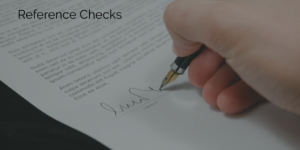 What will your references say about you?
What will your references say about you?
Some companies still ask for references as a part of the interview process. Think this is antiquated? Think again. A good reference can seal the deal with an employer or derail an impending job offer.
I just saw an ad for someone willing to check your references, for a price. Really? Did you know you can do it yourself or at worse, have a friend do it for you? It is always a good idea in a job search to know what your past employers will share about you. Contrary to popular belief, it is not illegal for employers to share information on past employees. Most don’t because while it may be legal, it may also get them sued. The sad part about this is that a truly bad employee can continue to jump from job to job with little information following them. Now you know how that idiot next to you got hired!
When you check your own references you want to call the company’s main number, your local office’s number AND your supervisor. You are probably fine calling the human resources departments unless they know you but you will want a friend to call your boss. Some companies will ask for a signed background release form. If so, just create your own. Yes, you can pay for someone to do all this for you but if you are out of work, what do you have more of? Time or money?
Reference check questions to ask
After you introduce yourself you will want to ask some of the generic questions that most companies ask to start with then move into the ones you want answers to.
"Hello, I am calling to check references on a previous employee of yours..."
OK, here is where the honesty line gets a little fuzzy… What you wish you could do is call and ask “If a company calls you to ask about me, what will you tell them?” But if you did that, what do you think they would say? You think they would tell you everything? Because of that, if you want to know what they will REALLY say you need to, or have someone else) play the role of a potential employer. That means they need to have a story. Name of the company, their name/position, a call back number, what position you are applying for, etc… Wait, maybe it is worth it to pay someone to do it for you.
But let’s assume you press on and save your money. Here are some questions to ask. The first two you should always receive answers to, the others… maybe not.
- What was the position they last held at your company?
- What were their dates of employment?
- Are they eligible for re-hire?
- How much was their salary and bonuses or commission?
- Did they provide a 2-week notice when they resigned?
- How would you rate their performance in the position?
- What were their biggest strengths / weaknesses?
If they keep answering, you keep asking. When someone calls your manager/supervisor they need to ask more direct questions. Many managers will refer them back to human resources but not all. Previous managers are sometimes the most damaging or helpful references. It also helps if the person calling says they are your potential new manager.
At the end of the day, doing a little social engineering to check your own references might feel (is) a little dishonest but if you are worried that you will get a bad employment reference you are better off knowing ahead of time.
References Provided Upon Request
This one KILLS me! In many of my past jobs we have requested that people provide us with references for us to call. They are usually past supervisors or coworkers but the key here is that the candidate is providing us with the names and numbers of the people to call. Think they are always good? Think again. Here are some of the funny comments I have gotten when calling references provided by candidates:
They put ME down as a reference? (laughing)
The only reason they didn't take anything is that it's all screwed down. (hotel manager)
They will be great for the first 30 days.
If you are providing references for a potential employer to call you better know what they will say about you! You want to call each person and ASK them if you can use them as a reference before you start your job search. Then once you submit their names to a potential employers contact them again and let them know a little about the position(s) you are applying for and what company it is with. That way they can tailor their information about you to the specifics of the job. It is very helpful to send them the job description.
At the end of the day references are not always a make or break part of the interviewing process but sometimes they are. Do you want to risk it?
There are many things of which a wise man might wish to be ignorant.
Ralph Waldo Emerson
